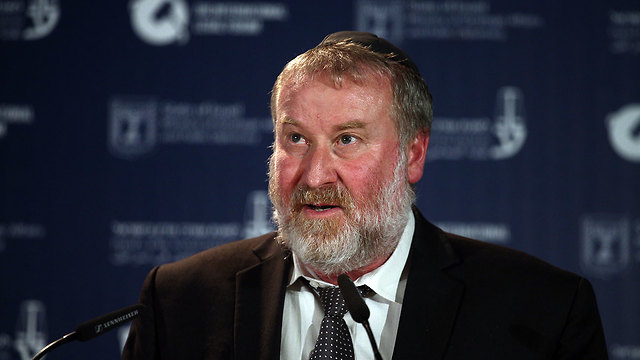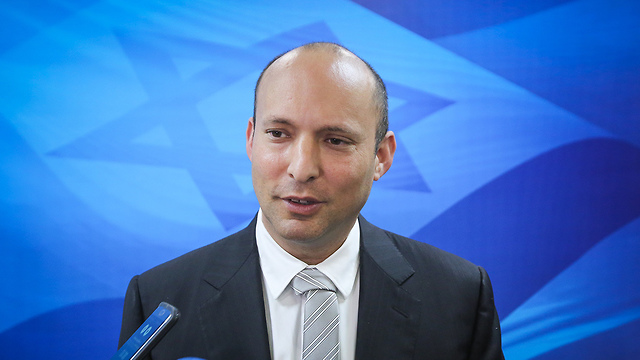
Ministerial Committee for Legislation approves new IDF draft bill
Yisrael Beytenu Minister Sofa Landver appeals bill's approval, requiring committee or government to reconvene to cancel appeal before bill is sent to a preliminary Knesset reading; senior Justice Ministry officials say compromise reached between PM Netanyahu, UTJ fails to meet High Court conditions for an equal share of the burden.
One of the members of the ministerial committee, Immigration Absorption Minister Sofa Landver of the Yisrael Beytenu party, didn't show up for the vote but left a note stating her objection to the bill.
Following the vote, Landver filed an appeal against the bill's approval, requiring the committee or the government to reconvene to cancel the appeal.
It is still unclear how the Yisrael Beytenu faction will vote on Wednesday. Defense Minister Avigdor Liberman's party has said that its Knesset members, including Minister Landver, would vote against the law in its preliminary reading. A minister who votes against the coalition is summarily fired.
Earlier Monday, an Yisrael Beytenu source said the party would quit the government if the bill passed its third reading. Lieberman has yet to comment on the compromise that was reached late Sunday between Prime Minister Benjamin Netanyahu and Deputy Health Minister Yaakov Litzman of the United Torah Judaism party, but is expected to address the issue during a faction meeting Monday afternoon.
Senior Justice Ministry officials said Monday that the new draft bill approved by the Hasidic Council of Torah Sages failed to meet the rules and conditions presented by the High Court of Justice for an equal share of the burden. Attorney General Avichai Mandelblit told Justice Minister Ayelet Shaked before the vote that there is a constitutional obstacle to advance the law as it contradicts the equality value. Nevertheless, Shaked plans to send the bill to a preliminary Knesset reading, assuming the problem will be dealt with at a later stage.
According to the Justice Ministry officials, once the coalition factions and the prime minister reach a final decision on an acceptable draft bill, it will seen as a governmental bill and the attorney general would provide his final opinion pertaining to whether it meets the conditions for an equal share of the burden, as formulated by the High Court.

The bill is based on a framework put forward by Shas MK Yoav Ben-Tzur, which states that a goal will be set of 3,800 Haredi recruits joining the IDF and national service with each recruitment cycle—with their number gradually increasing.
In addition, the law will omit any sanctions or incentives, instead including an article starting that the government will inspect general draft quotas every five years and if it finds Haredi conscripts failed to meet them, the law will expire.
Justice Minister Shaked, who was one of the leaders of the compromise agreement, told Ynet earlier Monday that there was no need to drag the country to elections without any real, essential issue on the agenda.
"The State of Israel is neither a disturbed democracy nor a banana republic. In this crisis, everyone is right and everyone must compromise," the Bayit Yehudi minister clarified.
"The finance minister is right when he says that although the budget doesn’t have to be passed now, a promise has been made to pass the budget and promises must be kept. The Haredim are right when they say that a new draft bill has to be passed, but it doesn’t have to pass three readings right now. There's still time. And the defense minister is right when he says that the bill has to be coordinated with him."
Shaked stressed that after the bill passes its preliminary reading, the rest of the legislation process will be coordinated with the attorney general and with the Defense Ministry. "The bill is still subject to changes in the Foreign Affairs and Defense Committee and its wording will be coordinated with the Defense Minister," she said.
"There is no real dispute here," the justice minister added. "It's a political crisis, a crisis that needs to be solved. I don’t think there's anyone in the public who is interested in elections now. Our country is important to everyone and democracy is important to everyone, and we can't make a mockery of the election process and dissolve a government every two or three years."
Addressing claims that Prime Minister Netanyahu was interested in elections, Shaked said: "Netanyahu realized that none of the partners is interested in elections. He heads the coalition and it's his decision. I haven't heard about an ultimatum to stay in the government till November 2019. None of the parties has been given such an ultimatum."
As for the possibility of an indictment against Netanyahu, Shaked said: "If there is an indictment, we'll sit down and talk, but let's hope there won't be one. The prime minister is performing very well. The ministers are doing a good job in their ministries. We just have to let them work.
"In any event, investigations must not lead to elections under any circumstances. If investigations turn into a political elimination tool, democracy suffers. We will all wait patiently for the attorney general's decision. He is a serious person and will make a decision based solely on the evidence, not on protests or articles. There's still time for that, so let's get back to work."
Bayit Yehudi leader Naftali Bennett said Monday, "I believe and hope there won't be elections. I want to live in a country where elections are held on time.
"We chose national responsibility. This is an empty crisis. In the past decade, there has been a plan which has led to a slow increase in the number of Haredi recruits. If someone really thinks the IDF wants 30,000 Ger Hasidim with 17 different kashrut certificates and segregated bases and that it could be contained—they're wrong."
Tova Tzimuky and Alexandra Lukash contributed to this report.












